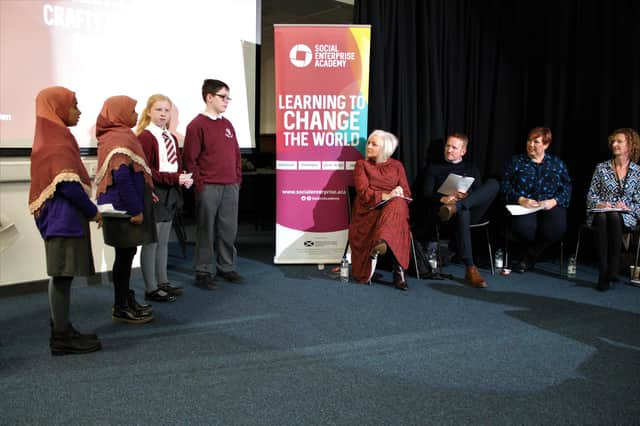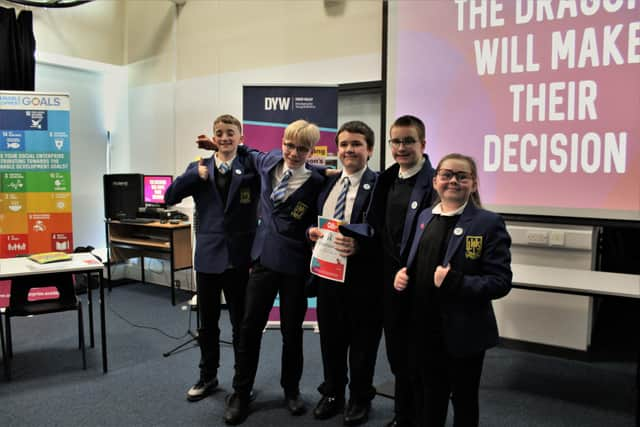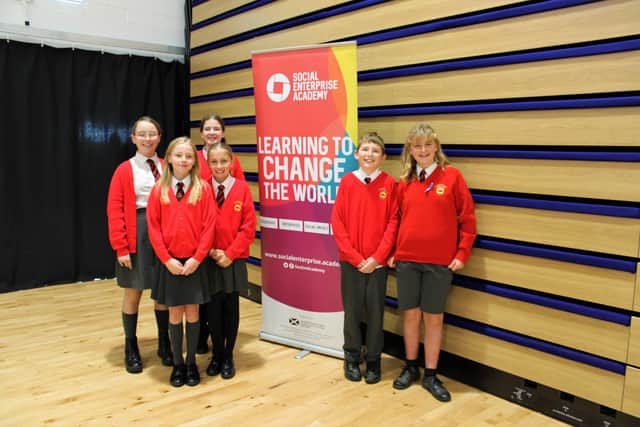Pupils from Falkirk district schools pitch social enterprise ideas to panel in Dragons' Den competition


The event, which provides an opportunity for pupils to gain professional advice on their social enterprise business ideas, took place at Larbert High School. The panel of ‘dragons’ included Julia Barclay, education team manager at Falkirk Council; Karen Wright, programme lead at DYW Forth Valley; Scott Henderson, managing director at Crunchy Carrots and Joan Alexander, education manager (east) at the Social Enterprise Academy.
All groups received seed funding as the dragons believed they were all worth investing in. An example of one of the many impressive pitches is P.I.E.C.E.S by St Francis Xavier’s RC Primary who are collaborating with a local care home to upcycle scrap fabric into patchwork items they can sell for charity.
Advertisement
Hide AdAdvertisement
Hide AdThere were two winners on the day, Larbert High School’s ASN group ‘Kit Kat Coding Club’ and Victoria Primary School’s ‘Cookies and Coffee Cafe’.


The Larbert group plan to set up a coding club within the school where pupils will pay a £1 weekly entry. With their profits they intend to buy materials such as frames, soil and seeds so that families and individuals in their community can establish their own vegetable gardens. They hope this will allow households to eat for less and ultimately alleviate some of the financial pressures related to the cost of living crisis. At Victoria Primary the pupils plan to open a community cafe. They intend for 45 per cent of profits from the cafe to be donated to Macmillan Cancer Support, 45 per cent to be reinvested back into the business and ten per cent to fund school experiences.
The young people are running their social enterprises as part of Social Enterprise Schools, which is delivered by the Social Enterprise Academy and empowers young people to affect social change in their communities while developing key core employability and entrepreneurial skills for the future.
Those groups taking part in the event were St Francis Xavier’s RC Primary, Victoria Primary, Larbert High (ASC), Wallacestone Primary P7M, Comely Park P7, Larbert High (FCT), Larbert High (Expressive Arts), Grangemouth High, Larbert High (Technologies), Wallacestone Primary P7H, Larbert High (Business) and Comely Park P6.
Advertisement
Hide AdAdvertisement
Hide AdJoan Alexander, education manager for Social Enterprise Academy, said: “The energy in the room was tremendous. It’s so important that they are empowered to be social changemakers...if the young people are passionate, there’s more chance they will do what they are actually planning to do. It’s about the experiential learning and the skills and friends they make along the way.”


Cecil Meiklejohn, leader of Falkirk Council, said: “I’m just absolutely blown away by the enthusiasm of the young people and indeed the depth and length that they’ve gone to with the ideas with a real social enterprise view to things. What is really fantastic is they’re looking to help either their own community or the wider community in the social enterprise that they’re looking to develop. Social enterprise is really important because it’s not about the private sector making profits, it’s about reinvesting back into the business or the community which is so important because that gives citizenship to our young people and makes them part of their local community and society in general.”